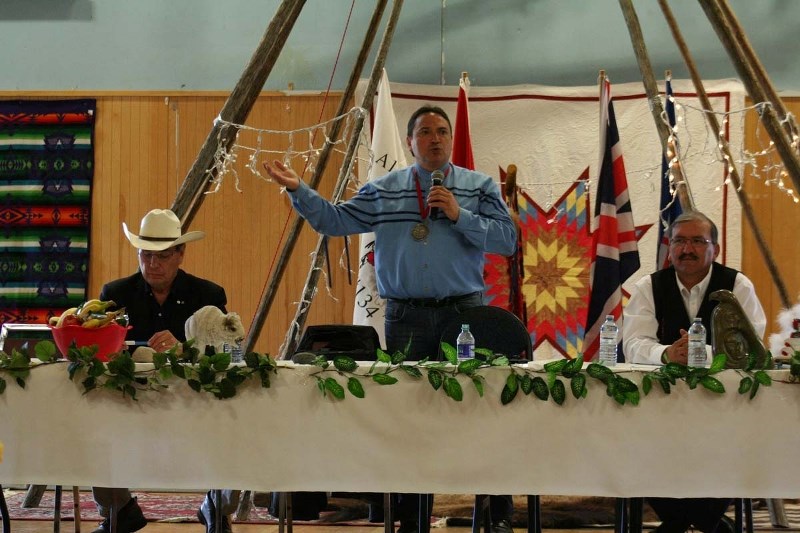Members of the Alexander First Nation got the opportunity this week to hear from high-profile national figures about the Truth and Reconciliation Commission’s report released earlier this month.
Alexander Chief Kurt Burnstick, National Assembly Chief Perry Bellegarde, and commissioner Chief Wilton Littlechild spoke to a crowd of about 200 people at the Kipohtakaw Education Centre last Tuesday about what the report means for First Nations moving forward.
For more than a century, aboriginal children were removed from their families and forced to attend residential schools where widespread physical, emotional and sexual abuse have been reported, in what has now been described as a cultural genocide. That last residential school wasn’t closed until 1996.
Bellegarde succinctly described the prevailing attitude within the residential school system by relaying a story his father had told him about a map on the wall of the school he attended.
“On the road to heaven was this little Indian boy carrying a Bible with short hair and a uniform, but on the road to hell was this Indian boy with braids and carrying a drum,” he said. “This was engrained in the people.”
He spoke of the importance of honouring the treaties, along with the United Nations Declaration on the Rights of Indigenous people, and implored the youth in attendance to never let anyone tell them they were getting a free ride on taxpayer dollars, because that simply isn’t true.
“We’re sharing all this land and resource wealth with our white brothers and sisters,” he said.
Littlechild spoke to the audience about the process during the commission’s work, which included collecting stories from survivors and their families all across the country.
Stories of abuse and suffering were widespread, he said, but noted the commission heard about many of the positive things to come out of the system as well, including getting an education, learning a new language, and making new friends and family – something he could personally relate to.
“I have brothers and sisters all across Canada because I went to residential school with them,” he said. “I have brothers and sisters in this room because I went to school with them at Ermineskin.”
But the fallout of the residential school system persists to this day, and many First Nations children are still being removed from their families through various state interventions — at a rate of close to 70 per cent.
Littlechild and Bellegarde emphasized the path to reconciliation may not be an easy one, but it begins with mutual respect, having good relations, and reconnecting with the elements of aboriginal culture that are centuries old, if not millennia.
But most significantly, reconciliation will mean honouring the treaties, and both sides seeing each other as equal partners on Turtle Island.
“That’s how we’re going to create a better country for our people, that peaceful coexistence and mutual respect between our peoples,” Bellegarde said.
Burnstick noted the Alexander school was an appropriate place to hold one of the first public meetings following the release of the report, given its unique history.
“This school is symbolic of some the change that can happen within our nations as we were the first nation to take over full local control of our education system back in 1992, something we’re very proud of,” he said.
For principal Cory Arcand, knowing his students had the opportunity to hear from this group of respected elders was an honour. He said the idea of seeing both sides as equal partners is one emphasized within the school – the K-12 curriculum is taught, but there’s also a heavy emphasis on learning about their culture.
“Today, our ways are still here and our way of life is still here,” he said. “At this school, the Kipohtakaw Education Centre, we introduce them to that identity that was once forbidden.”
A full copy of the commission’s report is available online at www.trc.ca.




